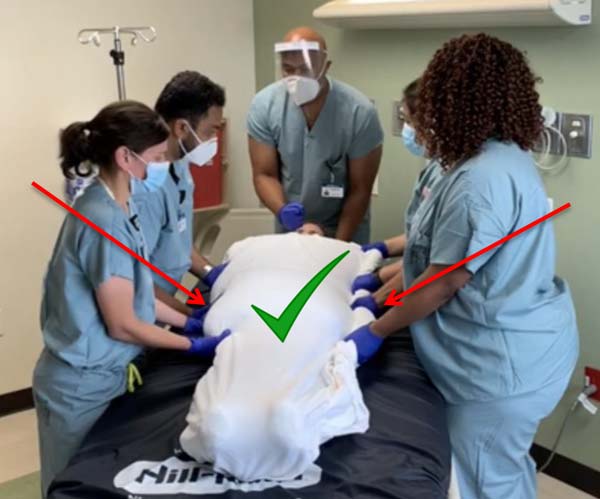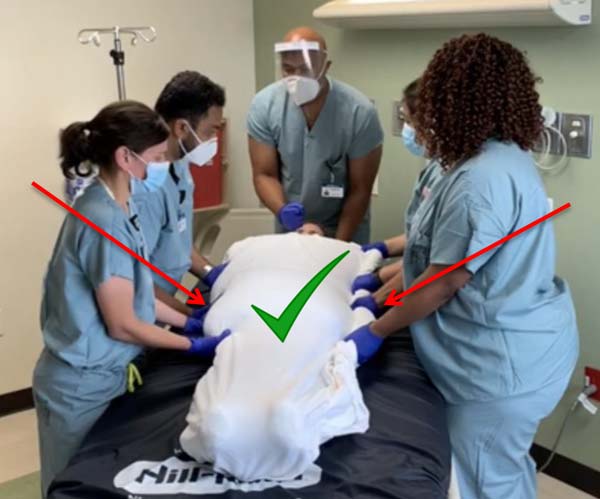
COTA Offers Significant Contributions to the Rehab of Patients With COVID
Kelly Parmet, a COTA from Texas, acted quickly to implement an innovative program to create a uniform technique and protocol for turning and positioning ICU patients who were intubated due to COVID.

Kelly Parmet, COTA
Senior Occupational Therapy Assistant and Clinical Fieldwork Coordinator, Harris Health System
Location: Texas
Certified in 2011
Finding a New Way to Help Patients With COVID Breathe
When the ICU at Lyndon B. Johnson Hospital filled with patients who were intubated due to COVID, Kelly Parmet, a senior occupational therapy assistant, and the hospital’s rehab staff researched what could be done to help these patients. Armed with evidence-based research and their years of experience, the rehab staff decided to assist with placing the patients into prone position. Prone position is the medical term for lying flat on the stomach, and it is used in health care settings to help patients with certain conditions and symptoms get relief. It relieves pressure caused by gravity, distributes oxygen evenly, and helps clear respiratory secretions.
While placing patients with COVID into the prone position had been covered in the news, LBJ Hospital was one of the first hospitals in Houston, TX, to integrate this practice. To carry out the task, the hospital used “prone teams” made up of occupational therapists, physical therapists, respiratory therapists, nurses, and physicians.
The OT Innovation
Because of the overwhelming number of patients in the ICU who were intubated due to COVID, multiple prone teams and specialists frequently rotated through the hospital system to perform the prone maneuver. Kelly observed that there was no consistency in the process; each team performed the prone maneuver differently. She recognized that if the prone position was not executed properly, there were potential risks of injury or impairment to the patient. Kelly also observed that after patients were taken off the ventilator and moved out of the ICU, they were experiencing complications from being in prone position for prolonged periods. These complications significantly limited the patients’ ability to perform routine activities of daily living, caused decreased independence, and contributed to a longer hospital stay as well as continued therapy after discharge from the hospital.
Based on her observations, Kelly acted quickly to develop and implement a standardized process for turning and positioning patients to prevent injuries and other complications. From there, she created a training program with videos and other educational materials geared toward all disciplines that communicated the importance of the prone position, the research regarding the positioning of patients who are intubated due to COVID, the potential risks of the positioning, and the proper techniques to perform the prone maneuver correctly.

Producing Positive Results
Kelly’s program set the standard for how prone positioning should be performed at LBJ Hospital. She worked to have the training materials added to the hospital system’s Learning Resource Center so that they were accessible to staff. Additionally, all the training resources were distributed to surrounding hospitals. Kelly also presented her work at local and state professional organizations, which helped increase awareness about the benefits of the proper positioning technique as well as promote the role of occupational therapy.
“Innate to occupational therapy practitioners is knowing the effects of positioning on a patient, along with what to look for and how to correct the posture of a patient to reduce complications that may be associated with prolonged positioning.”
Kelly Parmet, COTA
2021 NBCOT Innovation Award Winner
Overall, Kelly’s program allows for better body mechanics and positioning, provides more positive long-term outcomes for patients, and encourages health care professionals to feel more comfortable and confident in the process.
Certified in 2011, Kelly has won various awards for her work in the occupational therapy field, including Clinical Educator of the Year and Occupational Therapy Assistant of the Year from the Texas Occupational Therapy Association.
Related News
The Innovation and Impact Award winners have demonstrated actions that truly support NBCOT’s mission of serving the public interest by advancing client care and professional practice.
NBCOT launched the Innovation and Impact Awards in 2020 to publicly recognize the exceptional work OTR and COTA certificants do in their daily practice.